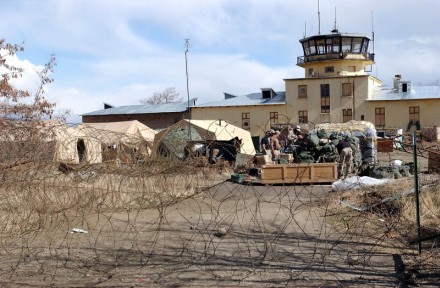The Obama administration is basking in praise for its welcome commitment to shut down the American detention center at Guantánamo Bay. But it is acting far less nobly when it comes to prisoners held at a larger, more secretive military detention facility at Bagram Air Base in Afghanistan.

Bagram Air Base in Afghanistan.
In February, the new administration disappointingly followed the example of the Bush White House in opposing judicial review for prisoners who have been indefinitely detained at Bagram without any charges or access to lawyers. The administration has now added to that disappointment by appealing a new federal court ruling extending the right of habeas corpus to some Bagram detainees.
The ruling was issued by Judge John Bates of the United States District Court for the District of Columbia. Narrowly crafted, the ruling essentially grants all non-Afghan Bagram detainees captured outside Afghanistan and held over six years without due process the same right to federal court review that the Supreme Court gave last year to similarly situated prisoners at Guantánamo.
Bagram differs from Guantánamo in that it is located in an active theater of war. Historically, habeas corpus has not extended to detainees held abroad in zones of combat. But the evidence suggests it was the prospect that Guantánamo detentions might be subject to judicial oversight that caused the military to divert captives to Bagram instead.
The theater of war excuse for denying judicial review, the judge found, is unpersuasive when the government imports detainees from elsewhere. “It is one thing to detain those captured on the surrounding battlefield at a place like Bagram,” Judge Bates wrote. “It is quite another thing to apprehend people in foreign countries — far from any Afghan battlefield — and then bring them to a theater of war, where the Constitution arguably may not reach.”
Although Judge Bates’s ruling addresses only 30 of 600 or so prisoners, he found that the process for determining whether a person has been properly labeled an “enemy combatant” even “less sophisticated and more error-prone” than the process the Supreme Court deemed inadequate at Guantánamo. This points to a wider due process problem affecting everyone now held at Bagram.
In the absence of a fair review process that complies with international and military law, there is no reason to feel confident that everyone detained at Bagram deserves to be there. The administration should focus on putting such a process in place, instead of wasting its energies in an appeal that simply recycles extravagant claims of executive power and perpetuates the detention policies of the Bush administration.



